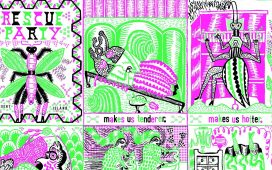During the ‘60s and ‘70s, butch/femme lesbians faced pushback from many second-wave feminists, who viewed their gender expression and sexuality as inherently “buying into patriarchal oppression (for femmes) and perpetuating patriarchal oppression (for butches),” Hoskin explains. Though this sentiment isn’t true, this brand of anti-butch/femme discourse continued throughout the 1980s and ‘90s. According to Hoskin, the sentiment was so pervasive that some feminist bookstores refused to stock books by femme authors.
The discourse started to shift in the mid-1990s, when femme regained popularity as a queer identifier and began to take on new meanings. In the early 2000s, popular narrative-based anthologies like Brazen Femmes: Queer Femininity broke ground by showcasing femme diversity and arguing in favor of femme as a “more expansive queer identity,” says Hoskin. It was around this time that phrases like “bisexual femme” and “queer femme” entered our cultural lexicon.
In her research, Hoskin examines different definitions of the word “femme.” They run the gamut across different communities, cultures, and historical periods. “What I find is that they share a common rejection of patriarchal femininity — the idea that femininity is the exclusive domain or property of cisgender, heterosexual, passive, white women,” she tells Them. As queer people, femmes challenge these implicit rules when they reclaim, redefine, and embody femininity.
Does “femme” mean the same thing as “woman?”
The short answer is no. The word “femme” describes a form of queer self-expression, not a person’s gender identity. Femmes can be women, and many are, but they can also be trans or nonbinary people or queer men. Likewise, not all queer or trans women identify as femmes.
In our patriarchal world, femmeness comes with some risks. This is the basis of femmephobia, or the systemic subjugation of and disdain for femininity under cisgender, heterosexual patriarchy. It’s a real phenomenon that affects femmes of all genders and sexualities. (“No fems” language on Grindr, anyone?) That’s why it’s so important to have a word like femme: It encapsulates the unique experience of navigating life as a queer person who presents in a feminine way.
Every femme has their own relationship to and experience of femininity. That’s part of the appeal of this label, especially in its modern, more expansive iteration. Femme is distinct enough to be definable, and broad enough to encompass a diverse array of people, cultural contexts, and aesthetics.
“Queer femmes take an existing set of restrictive gender norms, chop them up, rearrange them, throw many of them out the window, and are left with a beautiful, chaotic mosaic of diverse femininity,” says Sloan. “It’s a way of being purposeful with one’s femininity, rather than simply cleaving to existing mainstream gendered norms.”
Get the best of what’s queer. Sign up for Them’s weekly newsletter here.








